May 4, 2006
Puzzlehead
Movie Review By: SFAM
Year: 2005
Directed by: James Bai
Written by: James Bai
Degree of Cyberpunk Visuals: Low
Correlation to Cyberpunk Themes: High
Key Cast Members:
- Puzzlehead/Walter: Stephen Galaida
- Julia: Robbie Shapiro
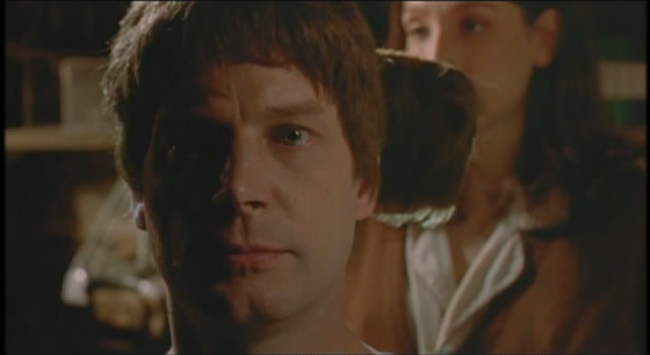
Overview: First let me give a great big THANK YOU to Puzzlehead Director, James Bai, who gave me a copy of this movie to review, even though it has not yet been released for general distribution (Indie filmmakers - take note! Feel free to send me your cyberpunk films to review prior to release! ![]() ). In looking at the movie poster and in hearing from others, I just HAD to get a copy of this to watch. Puzzlehead is about as far as you can get from a Hollywood production. You won’t see fast-paced action sequences here (quite the contrary – the movie is very slow paced), nor will you get futuristic scenery, or high-end FX. But make no mistake – even though the cyberpunk visuals are sparse, this is DEFINITELY a cyberpunk movie. The themes introduced and the fractured sense of humanity are fully cyberpunk.
). In looking at the movie poster and in hearing from others, I just HAD to get a copy of this to watch. Puzzlehead is about as far as you can get from a Hollywood production. You won’t see fast-paced action sequences here (quite the contrary – the movie is very slow paced), nor will you get futuristic scenery, or high-end FX. But make no mistake – even though the cyberpunk visuals are sparse, this is DEFINITELY a cyberpunk movie. The themes introduced and the fractured sense of humanity are fully cyberpunk.
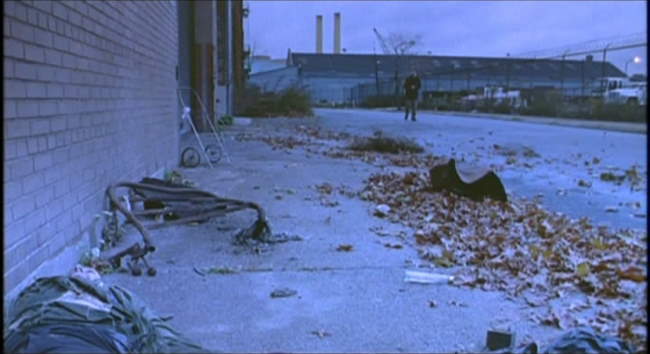
The Setting: Puzzlehead takes place in a futuristic dystopia, where all modern technology has been destroyed. Government still exists, but has devoted all resources for medical services. Unfortunately, the movie doesn’t give us enough intro as to why this occurs – the introductory narrative does mention that anti-federalists and the luddites forced the closure of all biomechanical laboratories (apparently they got rid of all “regular” technology in the cities as well), and that now, most resources are devoted to repopulation of the species. We can infer that the significant lack of people and an extreme reaction against technology coupled with at least a semblance of government might be due to some sort of genetic experiment gone awry.
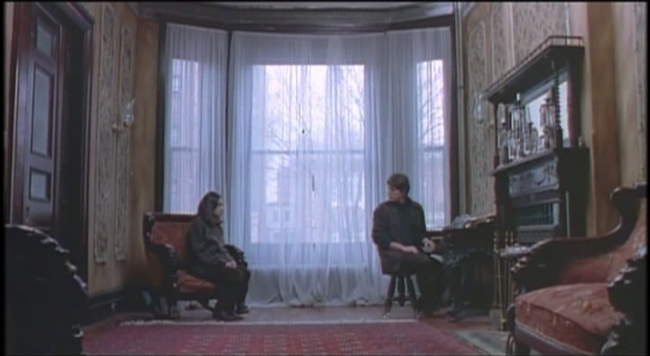
The majority of the movie takes place in a Victorian style townhouse, completely devoid of modern technology. Other sets include a decrepit, failing local grocery story, and a run-down apartment. Most external settings are comprised of run-down industrial areas. While the movie itself takes place in the future, aside for a few technology shots, the audience has to rely on the narrative and suspension of disbelief for this to work.
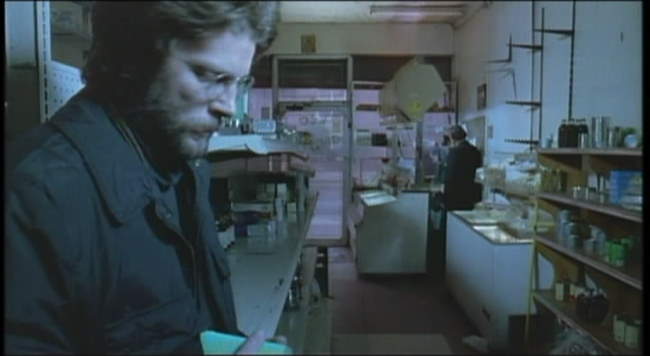
The Story: Humanity, it seems, is a shadow of its former self – random violence amongst is the norm, and virtually everyone we see in Puzzlehead is emotionally fractured. What little remains of the beleaguered populace is either making their way by becoming completely self-sufficient or by leaching off of others. It is in this setting that we focus on Walter – an emotionally fractured scientist who has trouble even walking out his front door. Unfortunately for Walter, he is in love with the very reclusive, local grocery store attendant, Julia (wonderfully played by Robbie Shapiro), but has never gained the courage to even attempt talking with her.
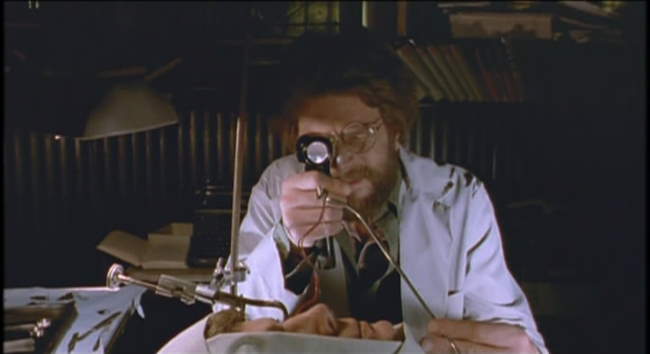
Walter (played by Stephen Galaida) decides to create an android named Puzzlehead (also played by Stephen Galaida) completely in his own image, apparently to serve as his external persona to interact in a world he prefers to avoid, and also to hopefully prompt interaction with Julia. After creating Puzzlehead, Walter spends significant time instructing Puzzlehead how to act. Walter is very derogatory controlling in his training of Puzzlehead. While Walter creates Puzzlehead with sentience, he severely restricts Puzzlehead’s behaviors. Over time, it becomes apparent to Puzzlehead that Walter has created and is using Puzzlehead for his own selfish purposes. In effect, Puzzlehead realizes that Walter sees him as nothing more than property. After Walter allows Puzzlehead to start venturing forth into society, he eventually comes into contact with Julia. Things get interesting when Walter follows up on Puzzlehead’s initial encounter with Julia.
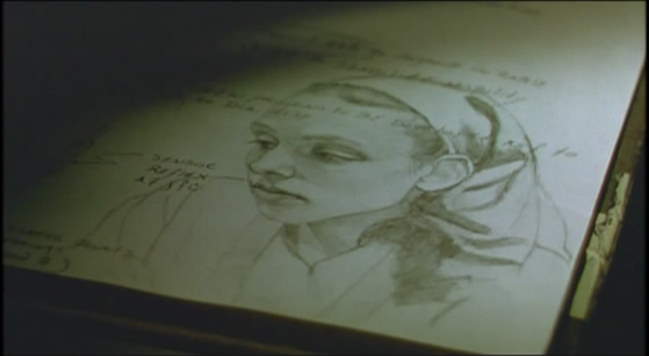
Puzzlehead Works Better on Second Viewing: Puzzlehead is told in narration format by the android, Puzzlehead, long after these events have taken place. In total, this approach works pretty well. Although, it does have the added side-effect of making the movie work better upon second viewing. There are a number of apparently throw-away comments that the narrator (Puzzlehead) gives that the audience simply can’t process until they’ve seen the story. However, upon second viewing, this adds a context to the movie that is missing the first time through.
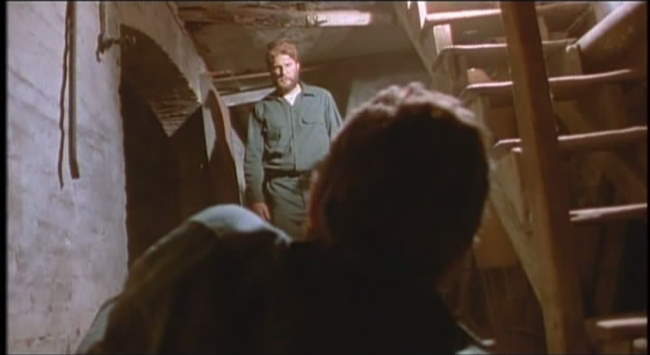
The Cinematography: Because the pacing in Puzzlehead is very slow, it runs the risk of inducing audience boredom. Luckily, this is largely overcome by the continually excellent shot selections throughout. It’s clear that significant thought went in to camera angles and interesting lighting approaches. Continually, we are treated to shots with extreme close-up foreground elements with action and movement occurring in the background. This approach, along with many low angle shots contributes to the sense of alienation the narrative provides.
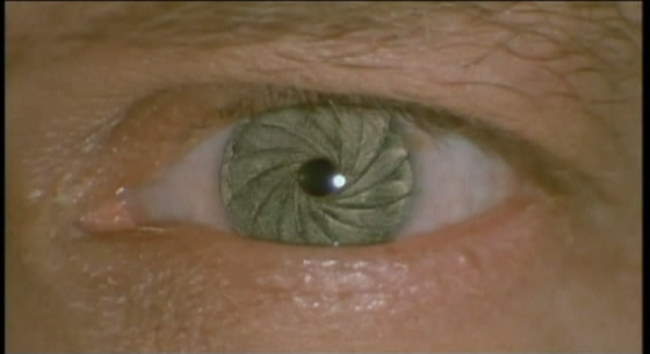
How does an Android Develop “true” Freewill? Puzzlehead provides us with a very interesting take on the development of android sentience and self-awareness. Puzzlehead is created using a neuron-scan from his creator’s brain (Walter), and thus, has all of his memories (yet, most are rendered meaningless without the context) – unfortunately, this scan has also left Puzzlehead riddled with Walter’s flaws. Puzzlehead’s biomechanical brain, like a human’s brain, is structured and controlled by belief structures and associative memories. Emotions, which are already troubling and confusing for Puzzlehead, develop into uncontrollable deviant behaviors.
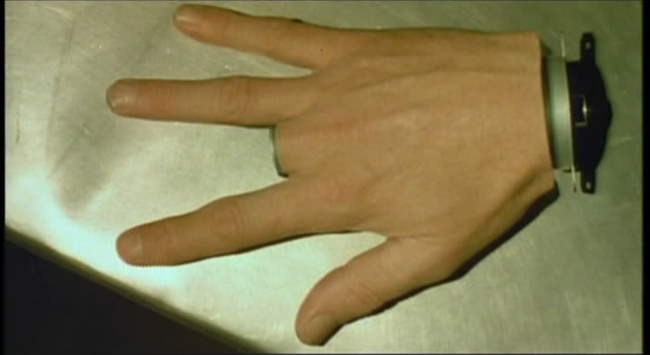
As Puzzlehead begins to develop self-awareness and freewill, he notices these tendencies that control him. These behaviors impact Puzzlehead’s ability to act the way the “real” him wants to act. His android brain, a combination of (undefined) biomechanical parts, is similar to a human’s in that he can recognize when he is doing deviant behavior, but cannot change his actions. But unlike humans, because Puzzlehead is an android, he can consider options for reprogramming his initial operating conditions. One question Puzzlehead ultimately poses is this – do androids have the possibility of becoming “exactly” the type of sentient being they want to become?
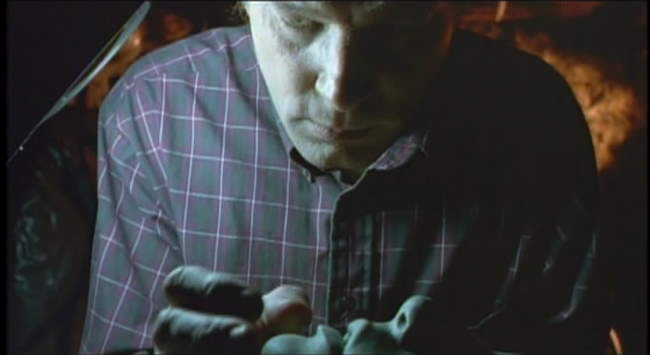
This potential ability to be “perfect” in the sense of transforming into exactly what Puzzlehead wants to become serves to reinforce Asimov’s notion that sentient robots would consider themselves superior to humans. In Puzzlehead, we get a realistic glimpse of how this might look.

Puzzlehead is an Intensely Personal Film: In judging this movie strictly on what I could learn from watching it I give it 7 stars (I would give it 7.5 if I had half stars – something I’m still working on). As a bonus, in talking with the film maker, it turns out that the film itself is an intensely personal metaphor of James Bai’s – one that you would never guess but makes perfect sense once you are told of it. Watching it with this knowledge, the complexity of the movie itself ramps up significantly, as does its accomplishment as a film – so much so that I’m strongly inclined to add another star to the review. I won’t give this part away, but instead offer Mr. Bai the opportunity to comment here if he would like to describe Puzzlehead’s personal nature in his own words.
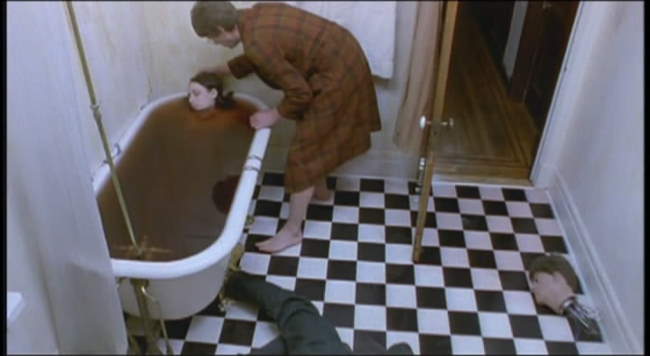
The Bottom Line: James Bai has created a very low-budget flick that’s definitely worth a watch. While I had some problems with the acting in some of the early scenes (Galaida as Puzzlehead acts way too human at the beginning, but eventually settles into the role), and a few of the visuals which seemed too 70s looking, these are diminished as the movie progresses. Bai poses some interesting thoughts on android development – some of which are unique to movies. If you can stand a very slow-paced, intellectual cyberpunk flick without a lot of cyberpunk visuals (although I LOVE the bathroom and broken arm scenes), Puzzlehead is definitely worth a watch.





Comments
August 2, 2006
cyberpunkreview.com » July 06 Site Statistics - Growing Fast! said (pingback):
[…] […]
August 20, 2006
cyberpunkreview.com » Sorry for the Downtime… said (pingback):
[…] […]
March 7, 2007
jaced said:
My thoughts on the film are here:
http://jaced.com/2007/03/06/puzzlehead/
October 17, 2008
rednblck said:
i actually have seen this film about 3 or so years ago at the San Diego Asian Film Festival. It was too slow for my friend but I enjoyed the film a lot. =]